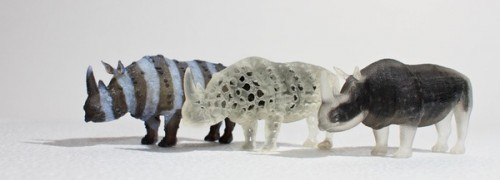- makeITcircular 2024 content launched – Part of Maker Faire Rome 2024Posted 2 weeks ago
- Application For Maker Faire Rome 2024: Deadline June 20thPosted 2 months ago
- Building a 3D Digital Clock with ArduinoPosted 7 months ago
- Creating a controller for Minecraft with realistic body movements using ArduinoPosted 7 months ago
- Snowflake with ArduinoPosted 8 months ago
- Holographic Christmas TreePosted 8 months ago
- Segstick: Build Your Own Self-Balancing Vehicle in Just 2 Days with ArduinoPosted 8 months ago
- ZSWatch: An Open-Source Smartwatch Project Based on the Zephyr Operating SystemPosted 9 months ago
- What is IoT and which devices to usePosted 9 months ago
- Maker Faire Rome Unveils Thrilling “Padel Smash Future” Pavilion for Sports EnthusiastsPosted 10 months ago
OpenFab: a new technology for 3Dprinting from MIT
This new technology from MIT is highly promising: the ability to use 3d textures/continuous mixture of materials for 3D printing:
3D printing hardware is rapidly scaling up to output continuous mixtures of multiple materials at increasing resolution over ever larger print volumes. This poses an enormous computational challenge: large high-resolution prints comprise trillions of voxels and petabytes of data and simply modeling and describing the input with spatially varying material mixtures at this scale is challenging. Existing 3D printing software is insufficient; in particular, most software is designed to support only a few million primitives, with discrete material choices per object.
We present OpenFab, a programmable pipeline for synthesis of multi-material 3D printed objects that is inspired by RenderMan and modern GPU pipelines. The pipeline supports procedural evaluation of geometric detail and material composition, using shader-like fablets, allowing models to be specified easily and efficiently. We describe a streaming architecture for OpenFab; only a small fraction of the final volume is stored in memory and output is fed to the printer with little startup delay. We demonstrate it on a variety of multi-material objects.
via OpenFab.
















